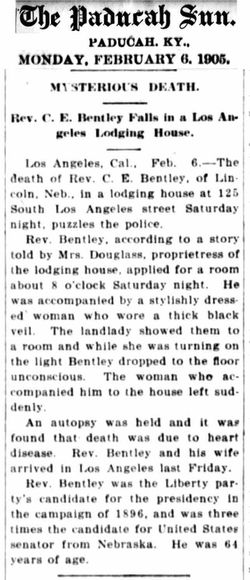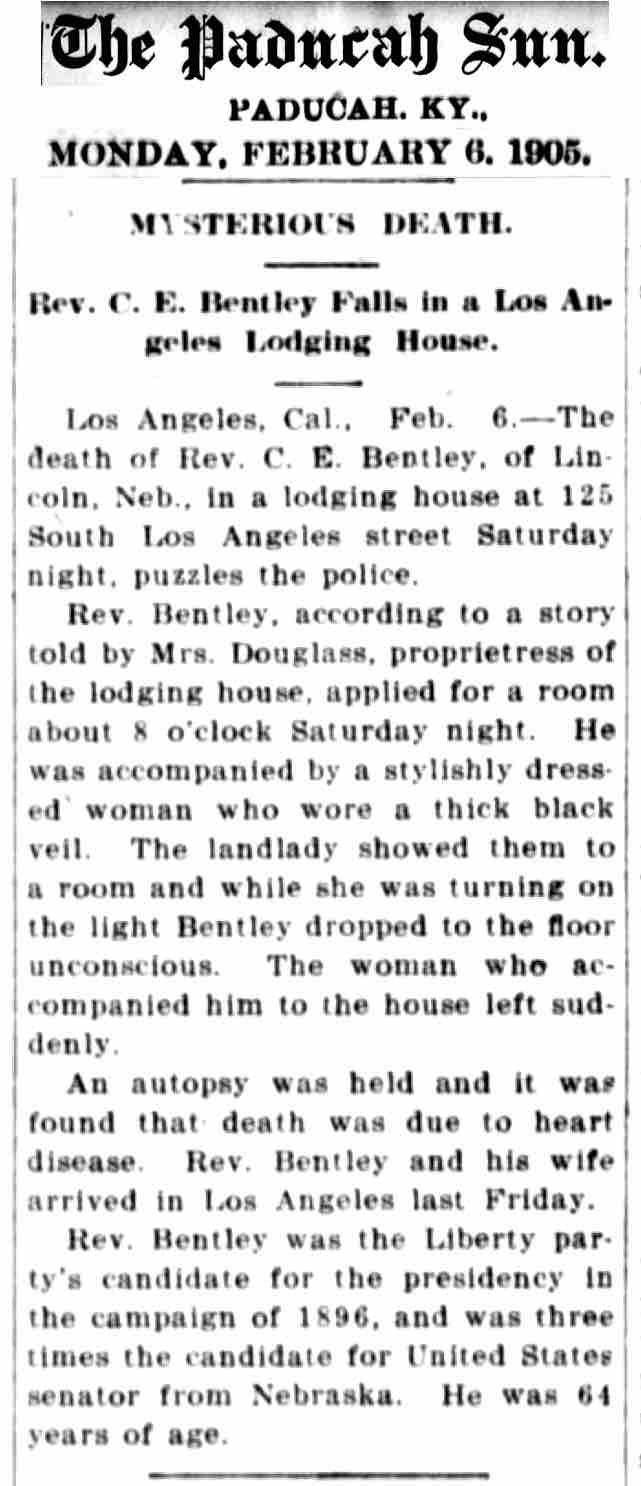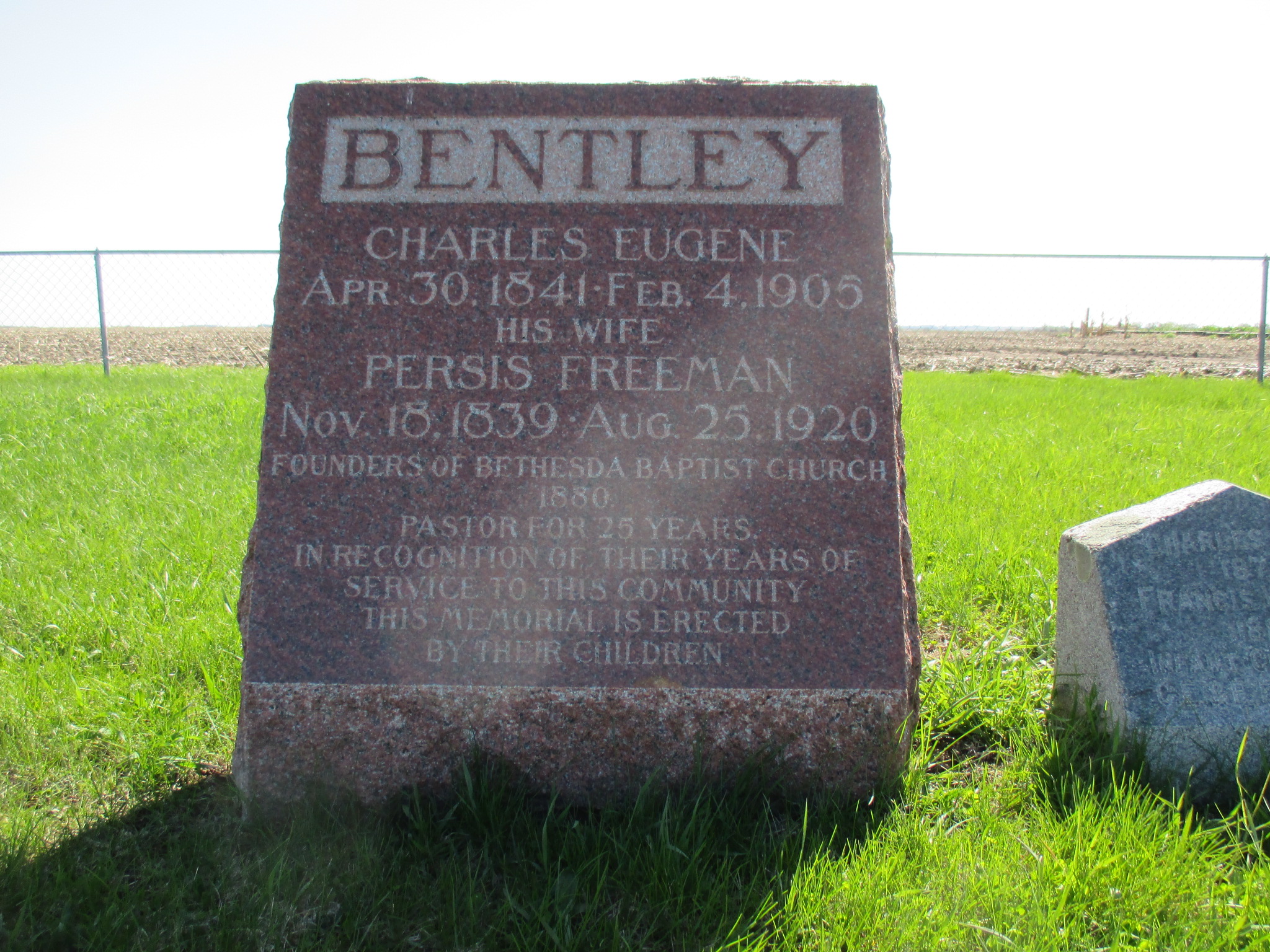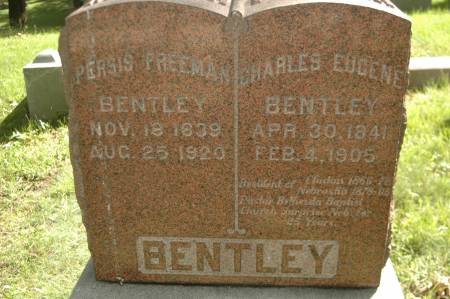Bryan would not have been the first Nebraskan to head a national Prohibition Party ticket. In 1896, when Bryan first ran on the Democratic ticket for the presidency, the Rev. Charles E. Bentley of Surprise, Nebraska, was the presidential nominee for the free silver wing of the Prohibition Party, which had split into gold and silver wings. Evidently it was Bentley who led the pro-silver members out of the national Prohibition Party convention In Pittsburgh, PA in the summer of 1896. His initiative may have led to his nomination for the so-called “National Party,” while the “gold” members of the Prohibition Party nominated Joshua Levering of Maryland for president.
There is much more about these campaign efforts on pages 145-159 (especially page 148) in the Fall 2014 issue of Nebraska History, published by the Nebraska Historical Society, Lincoln, NE) from which the above was taken.
The following was taken from an article about Charles E. Bentley in www.Wikipedia.com.
Bentley was born in Warners, N.Y., in April 1841. In 1863, Bentley married Persis Orilla Freeman. In 1866, they moved to Clinton, Iowa, where Bentley held several local offices. Later, they moved to Nebraska and settled near Surprise, where he started a Baptist church in 1880. Although a longtime Republican, Bentley split from the GOP in 1884 and joined the Prohibition Party, becoming chairman of the first Prohibition Party Convention held in Nebraska. He was chairman of the Nebraska Prohibition Party 1895-1896 and ran twice for the state legislature, once for Congress, and once for the U.S. Senate. In 1890 the family moved to Lincoln and in 1892 he ran for governor of Nebraska.
In 1896, Bentley was leader of the "Broad Gaugers" faction of the Prohibition Party at the party's national convention in Pittsburgh. After they split from the "Narrow Gaugers" who wanted a single plank favoring prohibition as the party's platform, he became a candidate for president of the United States on the National Party ticket, which had a platform for prohibition, women's suffrage, and the free and unlimited coinage of silver and gold. He finished last in a six-man race won by William McKinley. Bentley died February 6, 1905, while traveling in California. He is buried in Clinton.
While the Wikipedia article says he was buried in Clinton, Iowa, there is evidence he may have been buried at Surprise, Nebraska. Www.Findagrave.com has a listing for him in both locations (#5834843 and #22026182).
Bryan would not have been the first Nebraskan to head a national Prohibition Party ticket. In 1896, when Bryan first ran on the Democratic ticket for the presidency, the Rev. Charles E. Bentley of Surprise, Nebraska, was the presidential nominee for the free silver wing of the Prohibition Party, which had split into gold and silver wings. Evidently it was Bentley who led the pro-silver members out of the national Prohibition Party convention In Pittsburgh, PA in the summer of 1896. His initiative may have led to his nomination for the so-called “National Party,” while the “gold” members of the Prohibition Party nominated Joshua Levering of Maryland for president.
There is much more about these campaign efforts on pages 145-159 (especially page 148) in the Fall 2014 issue of Nebraska History, published by the Nebraska Historical Society, Lincoln, NE) from which the above was taken.
The following was taken from an article about Charles E. Bentley in www.Wikipedia.com.
Bentley was born in Warners, N.Y., in April 1841. In 1863, Bentley married Persis Orilla Freeman. In 1866, they moved to Clinton, Iowa, where Bentley held several local offices. Later, they moved to Nebraska and settled near Surprise, where he started a Baptist church in 1880. Although a longtime Republican, Bentley split from the GOP in 1884 and joined the Prohibition Party, becoming chairman of the first Prohibition Party Convention held in Nebraska. He was chairman of the Nebraska Prohibition Party 1895-1896 and ran twice for the state legislature, once for Congress, and once for the U.S. Senate. In 1890 the family moved to Lincoln and in 1892 he ran for governor of Nebraska.
In 1896, Bentley was leader of the "Broad Gaugers" faction of the Prohibition Party at the party's national convention in Pittsburgh. After they split from the "Narrow Gaugers" who wanted a single plank favoring prohibition as the party's platform, he became a candidate for president of the United States on the National Party ticket, which had a platform for prohibition, women's suffrage, and the free and unlimited coinage of silver and gold. He finished last in a six-man race won by William McKinley. Bentley died February 6, 1905, while traveling in California. He is buried in Clinton.
While the Wikipedia article says he was buried in Clinton, Iowa, there is evidence he may have been buried at Surprise, Nebraska. Www.Findagrave.com has a listing for him in both locations (#5834843 and #22026182).
Inscription
Founders Bethesda Baptist Church
Family Members
Sponsored by Ancestry
Advertisement
Advertisement








